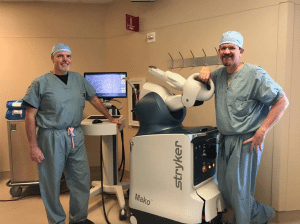Healthy Living

With church plants, Bible Institutes and humanitarian efforts in 13 countries on three different continents, World Reach founder Tim Prewitt is accustomed to international travel up to eight times a year. Last year, however, extreme hip pain was limiting his mobility. Thanks to a talented surgeon and an advanced robotic-arm assisted surgery available here in Birmingham, he is back to the mission field he loves.
As a young professional, Prewitt spent nine years working for Sears, Roebuck and Company before he began to feel that God was ushering him out of corporate management and into full time ministry. He and his wife, Carol, joined three other men in founding World Reach in 1981, and today the mission organization establishes Bible Institutes and indigenous, self-sustaining churches around the world. Prewitt’s travels often include encouraging staff or teaching in an Institute, but a year ago an x-ray of his right hip showed significant deterioration that could no longer be managed with anti-inflammatory medication. “The doctor told me it was bone-on-bone. It was exacerbated by the fact that I travel so extensively, walking and carrying suitcases and so forth,” he explains. Every move he made forced him to shift effort to the left side of his body to avoid pain and limited mobility.
Prewitt found that Andrews Sports Medicine & Orthopaedic Center was the first and only orthopaedic practice in Birmingham to offer robotic-assisted total knee, partial knee and total hip replacements using the Mako Robotic-Arm Assisted Surgery System. K. David Moore, M.D., says its technology has been a game changer in terms of accuracy and precision. “Traditionally, we’ve really done these operations based on the law of averages, using average anatomy. There are some ways you can accommodate for variations in people’s bone structure, but it’s been very imprecise. The Mako allows us to really customize each operation to the individual.” In knee replacements, for example, the Mako’s precision in placing an implant speeds the recovery and improves the longevity of the results. In hip replacements, dislocation is less common, as is unnecessary postoperative differences in leg length.

Dr. Moore’s treatment for Prewitt began with a CT scan of the joint and the construction of a 3-dimensional model that allowed him to plan the procedure in virtual reality a week prior to the surgery. Prewitt, who recently celebrated his 75th birthday, says his surgery took place at St. Vincent’s Birmingham on a Wednesday morning, and he was walking by Wednesday afternoon and home on Thursday. “I am 100 percent better. I can now move free of pain, without thinking I’m just causing more injury to what is already there,” he says. “I have complete freedom in terms of movement, range of motion.”
The demand for joint replacements is expected to rise in the next decade, and as the baby boomer generation sees a need for relief of arthritis symptoms beyond conservative treatment measures, the Mako System allows for a personalized surgery based on each patient’s specific diagnosis and anatomy. “This generation of people has been more active on the whole than previous generations and less tolerant of limiting their lifestyle because of joint pain,” Dr. Moore explains. “We certainly think that is important not just for quality of life but quantity of life. Once you stop moving, your health deteriorates fairly quickly. We want to make sure that people can stay active as long as possible.”
Now able to travel comfortably again, Prewitt says World Reach plans to bring on additional missionaries and add six new Bible Institutes in the countries he serves in 2018. For more information on how you can get involved in World Reach’s global efforts, visit www.world-reach.org. To connect with a physician who can help with conservative arthritis treatment or provide more information on the Mako System, visit AndrewsSportsMedicine.com or call 205-939-3699.
-Camille Smith Platt








